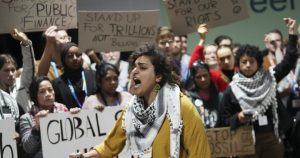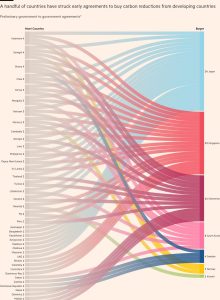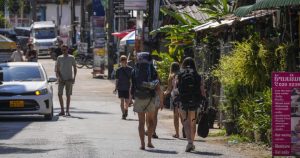Georgian president says pro-Russia ruling party ‘rigging’ election
Unlock the Editor’s Digest for free
Roula Khalaf, Editor of the FT, selects her favourite stories in this weekly newsletter.
Georgia’s president has accused the ruling party of deploying Kremlin-inspired intimidation tactics to rig upcoming elections and urged voters to choose between the EU and Russia.
Salome Zourabichvili told the Financial Times her country was being ruled by “a Russian government”. In power since 2012, the Georgian Dream party was waging a campaign based on propaganda, polarisation and fear tactics — just like in Russia, she said.
“This is anything but a normal election,” the president said, but rather “a choice between a European future and a Russian past”.
The October 26 parliamentary vote is seen by many in the opposition as the most important since independence from the Soviet Union in 1991 — a watershed moment that will determine whether their country becomes a sovereign democracy integrated with the west or falls back into autocracy and Russia’s orbit. Russian forces still occupy two Georgian breakaway regions — Abkhazia and South Ossetia.
Led by Bidzina Ivanishvili, an oligarch who made his fortune in Russia, Georgian Dream is pressuring state employees to vote for it, attacks opposition activists, threatens journalists and makes it hard for citizens abroad to cast their votes, the president said.
GD was not seeking to win “by traditional means”, Zourabichvili said. “So the means of winning the election [by GD] are rigging the elections. That has started.”
Zourabichvili was elected head of state in 2018 with GD’s support but has since become a fierce critic of its anti-democratic methods and for jeopardising Georgia’s bid to join the EU. Georgians overwhelmingly support EU membership, and state institutions are committed to achieving it under the constitution.
The country was last year granted EU candidate status, subject to conditions, but is now trailing Ukraine and Moldova, which have opened accession talks. GD has said it backed EU membership and claimed it has done more than previous governments to advance Georgia’s application.
However, the EU froze the accession process after the government pushed through a law on NGO transparency that the Georgian opposition and western capitals fear will be used to intimidate and crush civil society, as in Russia.
The law was adopted this summer despite mass protests involving 300,000 Georgians — 10 per cent of the population. Many of them were young people who were disillusioned with politics but are now fired up to vote.

The president said a high turnout would help to ensure GD was comprehensively defeated. The ruling party claims that its support stands as high as 60 per cent, while the opposition believes it is only half that. There are few reliable published polls, but one analyst familiar with internal polling for both sides said the election was on a knife-edge.
Opposition and civil society leaders worry that if GD and the other parties were level pegging on 40 per cent, then the ruling party might try to manipulate the results, leading to mass demonstrations possibly followed by a police crackdown.
“That’s why it’s so important to have mobilisation, because the only case scenario in which they can try to steal the election is if people do not mobilise themselves,” Zourabichvili said.
Irakli Kobakhidze, the GD prime minister, in August said the government would try to ban the main opposition parties. It is one of many provocative statements made by GD.
Its campaign is centred on an outlandish claim that it is resisting attempts by a “global war party” — its domestic opponents and Georgia’s western allies — to drag the country into Russia’s war against Ukraine. It has also accused the west of plotting to overthrow it in a revolution.
Zourabichvili described her country after 12 years of GD rule as “one-party rule”. “Completely. Totally. They control every institution in the country.”
As the campaign enters the final two weeks, the president urged the opposition to focus on the “essentials”, meaning “how do you get rid of a Russian government and Russian, whatever you call it, control or pressure?” She explained that the government deserved that moniker because it was using Kremlin’s techniques.
Georgia’s fractious opposition spurned the president’s appeal for a united front and has coalesced into four groups, the biggest of which is the Unity National Movement led by Mikheil Saakashvili. The jailed former president is revered by reformers but is reviled by others for having veered into authoritarianism while in power.
The four groups have signed a “charter” masterminded by Zourabichvili to work together on prioritising the reforms needed to get Georgia’s EU access process back on track, in the hope of starting membership talks next year.
But they have not agreed to her plan for an interim technocratic government to do the job before holding fresh elections.
Zourabichvili’s presidential term comes to an end later this year. She declined to comment on speculation that she could lead an interim government, but said: “In this country you don’t rule anything out, ever.”
The president doubted the opposition parties would be able to form a coalition government in the two weeks allowed by the constitution after election results are certified. An interim administration would give clarity to voters, she argued.
“I think that the population has understood maybe better than the political parties that it is a referendum and that it’s a real choice for the future.”
#Georgian #president #proRussia #ruling #party #rigging #election




